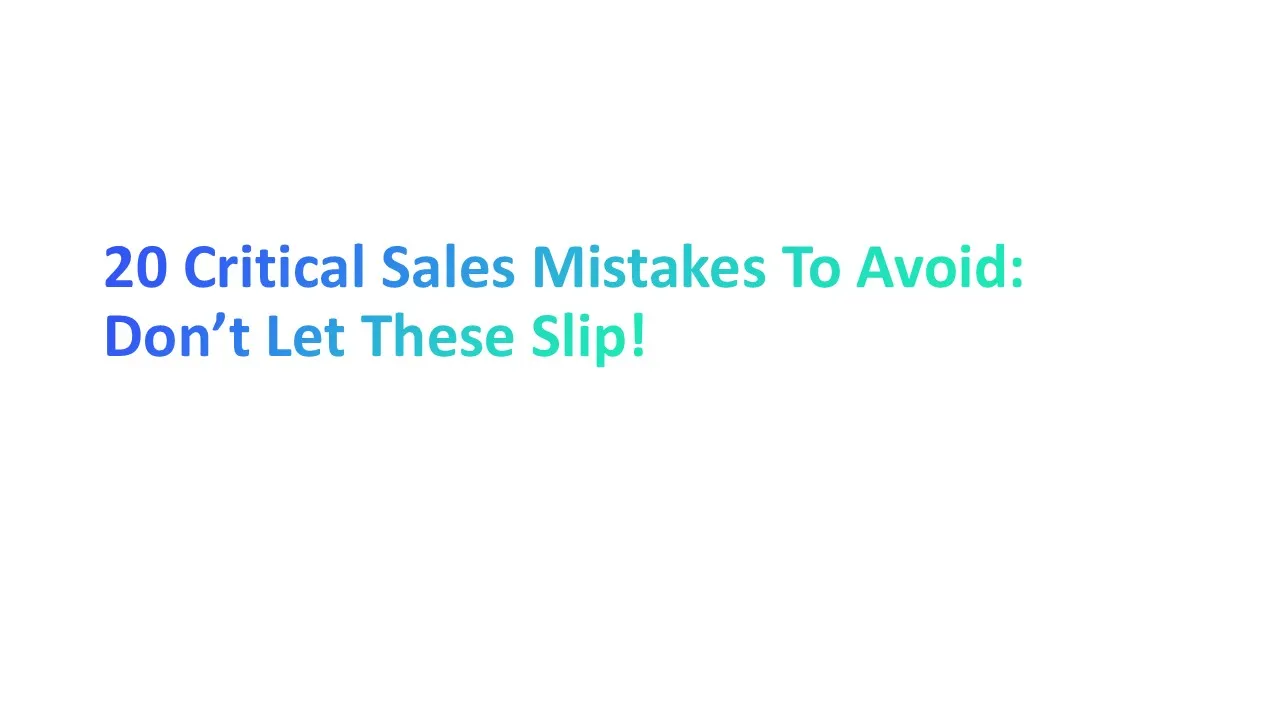Avoiding sales mistakes is crucial for success, yet even seasoned sales reps can fall into common traps that cost them deals.
Did you know that 57% of sales reps miss their quotas due to avoidable errors?
In this guide, we’ll cover the top 20 sales mistakes to avoid, best practices to handle them and help you streamline your sales process and connect better with potential customers right prospects.
Top Sales Mistakes to Avoid in 2024

1. Overcomplicating the Sales Process
One common sales mistake to avoid is making the sales process too complicated. When the sales process has too many steps, it can confuse both sales reps and potential customers. This slows things down and makes it harder to close deals.
Why it’s important:
A simple sales process helps your sales team work faster and better. It also makes it easier for potential customers to understand what you’re offering.
How to fix it:
- Break down your sales process into clear, easy steps.
- Focus on what’s necessary, like understanding the customer’s needs and offering the right solution.
- Avoid adding too many steps that don’t help close deals.
2. Failing to Embrace New Technologies
Another big mistake sales teams make is not using new technologies. Sales reps who don’t use tools like CRM systems or automation software often fall behind.
Why it’s important:
New technologies help sales reps keep track of potential customers, follow up on sales calls, and improve their overall performance. Using the right tools can make a big difference in closing deals.
How to fix it:
- Start by finding the right technology for your sales team.
- Look for tools that help you manage your sales pipeline and keep in touch with customers.
- For example, a good CRM system can help you organize your sales calls and track your progress.
3. Not Having a Follow-Up Plan
One of the biggest sales rep mistakes to avoid is not having a solid follow-up plan. Many sales reps think the job is done after the first meeting or sales call, but that's not true. Following up is essential.
Why it’s important:
Without a clear objective for follow-up, potential customers might forget about you. Without a plan, you’re leaving money on the table.
How to fix it:
- Create a clear follow-up strategy.
- Decide when and how to follow up after every interaction with a potential customer.
- Use reminders and tools like CRM systems to keep track of your follow-ups. This will keep you organized and make sure no potential deals are overlooked.
4. Ignoring Social Selling
Another critical mistake sales teams make is ignoring social selling. Social media plays a huge role in connecting with potential customers. Ignoring it can mean missing out on valuable opportunities.
Why it’s important:
Social selling helps you reach potential customers where they spend their time online. Social media is also a great way to build relationships and trust with customers before you even make the first call or sales pitch.
How to fix it:
- Start by building a strong social media presence.
- Share valuable content that helps potential customers solve their problems. Engage with them through comments, likes, and direct messages. This way, you stay top of mind when they’re ready to buy.
- Make social selling a regular part of your sales strategy, and watch your sales pipeline grow.
5. Relying Too Heavily on Automation
One of the common sales mistakes to avoid is relying too much on automation. While automation tools can make the sales process more efficient, overusing them can backfire.
Why it’s important:
Sales reps who depend too much on automation might miss the personal touch that builds relationships with potential customers. Automation can’t replace genuine conversations and human connections.
How to fix it:
- Balance automation with personal interactions.
- Use automation for tasks like scheduling sales calls or sending follow-up emails, but make sure to personalize your messages.
- Engage directly with customers when discussing their specific needs or concerns. This way, you can build trust and improve your chances of closing deals.
6. Overloading on Information
Another big mistake sales teams make is overloading potential customers with too much information. When you provide too many details at once, it can overwhelm the customer and make them lose interest.
Why it’s important:
Customers need clear, concise information to make decisions. If you give them too much at once, they might feel confused or pressured, which can lead to lost sales.
How to fix it:
- Simplify your sales pitch. Focus on the key benefits of your product or service and how it solves the customer’s problem.
- Break down complex information into smaller, easy-to-understand pieces.
- For example, during a sales presentation, highlight the most important features first, and then offer additional details as needed.
7. Failing to Qualify Potential Customers Early On
One of the most common sales mistakes to avoid is not qualifying potential buyers or customers early in the sales process. Sales reps often spend too much time on leads that are unlikely to convert. A skilled sales representative knows how to navigate customer concerns and close deals efficiently.
Why it’s important:
By qualifying potential customers early, you can focus your energy on those who are most likely to buy. This increases efficiency and helps you close more deals.
How to fix it:
- Ask the right questions early on.
- Determine if the potential customer has the budget, need, and authority to make a purchase.
- Use a sales pipeline to track where each lead is in the process. This way, you’ll know which potential customers to prioritize and which to move on from.
8. Undervaluing Your Product or Service
Another major mistake sales teams make is undervaluing their product or service. This can happen when sales reps are too eager to close deals, leading them to offer discounts or lower prices without considering the true value.
Why it’s important:
Undervaluing your product not only cuts into profits but also sends the wrong message to potential customers. If you don’t believe in the value of what you’re selling, why should they?
How to fix it:
- Focus on the unique benefits of your product or service.
- Make sure your sales pitch clearly explains why it’s worth the price.
- Highlight success stories and customer testimonials to back up your claims.
- Remember, a good sales presentation showcases the value, not just the cost.
9. Not Listening to Customer Needs
One of the biggest sales mistakes to avoid is not listening to your customers. When sales reps talk too much and don’t listen, they miss important details about what the customer really needs. One of the biggest mistakes sales teams can make is ignoring feedback from customers.
Why it’s important:
By listening to your customers, you can identify their challenges and adjust your sales pitch to address their needs. If you don’t listen, you risk losing the sale.
How to fix it:
- Focus on asking open-ended questions during sales calls.
- Let the customer talk about their challenges and what they’re looking for in a product or service.
- Take notes and repeat back what you’ve heard to make sure you understand. This shows the customer that you’re paying attention and genuinely care about solving their problem.
10. Overpromising and Failing to Deliver
Another critical mistake a good salesperson does is overpromising and then failing to deliver on those promises. When sales reps make promises they can’t keep, it damages trust and leads to unhappy customers.
Why it’s important:
Overpromising might help you close a deal in the short term, but it often leads to long-term problems. Customers who feel misled are less likely to return, and they may share negative feedback with others.
How to fix it:
- Be honest about what your product or service can and cannot do. Set realistic expectations with your customers from the start.
- If there are any limitations or potential challenges, be upfront about them.
- This way, your customers know exactly what to expect, and you can build a strong, trustworthy relationship with them.
11. Relying Too Heavily on Scripts
One of the common sales mistakes to avoid is depending too much on scripts during sales calls. Scripts can be helpful, but they shouldn’t replace real conversations with potential customers.
Why it’s important:
When sales reps rely too much on scripts, they might sound robotic and disconnected. Customers can tell when someone is reading from a script, and it can make them feel like they’re not being listened to.
How to fix it:
- Use scripts as a guide, not a crutch.
- Practice the key points you need to cover, but be flexible.
- Listen to what the customer says and respond naturally.
- Ask questions that show you’re interested in their specific needs. This will help you build a better connection with the customer and increase your chances of closing the deal.
12. Using Low Prices as the Only Sales Tactic
Another big mistake is relying on low prices to win sales. While offering a competitive price can be important, it shouldn’t be the only reason a customer chooses your product or service.
Why it’s important:
When you focus only on low prices, you risk undervaluing your product. Customers may start to see your product as cheap rather than valuable. Additionally, competitors can easily undercut your price, leaving you with little to offer.
How to fix it:
- Highlight the unique benefits and value of your product or service. Show how it solves the customer’s problems or meets their needs better than the competition.
- Use testimonials and case studies to demonstrate why your product is worth the price. This approach helps you stand out from competitors and build long-term customer relationships.
13. Focusing Only on Short-Term Gains
Most salespeople fall into this mistake of focusing only on short-term gains. Sales reps who chase quick wins may miss out on bigger opportunities that can lead to long-term success.
Why it’s important:
When you focus only on short-term gains, you might make decisions that hurt your business in the long run. For example, you might offer deep discounts to close a deal quickly, but this can lower the perceived value of your product or service.
How to fix it:
- Balance short-term goals with long-term strategies.
- Focus on building strong relationships with potential customers.
- Offer value through excellent service and follow-up. This way, you can secure more deals and create loyal customers who will come back in the future.
14. Neglecting to Track Performance Metrics
Another critical mistake in sales is neglecting to track performance metrics. Without tracking, sales teams might not know what’s working and what’s not, making it harder to improve.
Why it’s important:
Tracking metrics helps you understand where you are succeeding and where you need to improve. For example, if you’re not tracking how many potential customers convert into actual sales, you won’t know if your sales process is effective.
How to fix it:
- Set clear performance metrics for your sales team.
- Track things like sales calls, follow-up rates, and closing deals. Use a CRM system to keep all this information organized and easily accessible.
- Regularly review your performance metrics to identify areas for improvement and celebrate successes.
15. Ignoring the Sales Pipeline
One of the biggest sales mistakes to avoid is ignoring the sales pipeline. The sales pipeline helps you track where potential customers are in the sales process. If you don’t pay attention to it, you might miss important opportunities.
Why it’s important:
The sales pipeline gives you a clear view of your sales process. It helps you see which deals are close to closing and which ones need more work. Ignoring it can lead to missed sales and wasted time. .
How to fix it:
- Regularly check your sales pipeline. Make sure you know where each potential customer is in the process.
- Use tools like CRM systems to keep track of your sales pipeline and set reminders for follow-ups.
- By staying on top of your pipeline, you can close more deals and avoid losing potential customers.
16. Underestimating the Competition
Another critical mistake is underestimating the competition. Some sales teams focus on talking too much about their product or service that they forget to keep an eye on what competitors are doing.
Why it’s important:
Your competitors are always looking for ways to win over your potential customers. If you underestimate them, you might lose business to them.
How to fix it:
- Stay informed about your competition. Regularly research what they’re offering and how they’re positioning themselves in the market.
- Use this information to highlight the unique benefits of your product or service in your sales pitch.
- By understanding your competition, you can better position yourself to win over potential customers.
17. Being Unprepared for Objections
One of the biggest sales mistakes to avoid is being unprepared for objections. During the sales process, potential buyers or customers often raise concerns or questions. If you don’t have good answers, you might lose the sale.
Why it’s important:
Handling objections well can turn a "no" into a "yes." When sales reps are ready with thoughtful responses, they show that they understand the customer's concerns. This builds trust and makes the customer more likely to buy.
How to fix it:
- Prepare for objections by thinking about the common questions customers ask.
- Practice your responses so that you can answer quickly and confidently.
- Use data or customer success stories to back up your claims. This will help you close more deals and avoid this common sales mistake.
18. Forgetting the Human Element
Another mistake sales teams make is forgetting the human element. Sales isn’t just about numbers and targets; it’s about connecting with people. When sales reps focus too much on the sale and not enough on the customer, they miss out on building strong relationships.
Why it’s important:
People buy from people they trust. If a sales rep comes across as too pushy or doesn’t listen, potential customers might look elsewhere. Building a personal connection with customers can increase sales and lead to repeat business.
How to fix it:
- Focus on building relationships, not just closing deals. A good sales person always strives to build trust with potential customers.
- Listen to your customers and show empathy for their challenges. Personalize your sales pitch to address their specific needs.
- By treating customers as people, not just potential sales, you can create lasting relationships and improve your sales performance.
19. Failing to Close Deals Due to Poor Sales Craftsmanship
One of the common sales mistakes to avoid is the sales representatives failing to close deals because of poor sales craftsmanship. Sales reps might struggle to seal the deal if they don’t master the necessary skills.
Why it’s important:
Closing deals is a crucial part of the sales process. If you lack the skills to close effectively, you might lose potential customers.
How to fix it:
- Focus on improving your sales craftsmanship.
- Practice your sales pitch and refine your closing strategies.
- Learn from experienced sales reps and get feedback on your techniques. By mastering these skills, you can close more deals and avoid this common mistake.
20. Using Too Many Filler Words During Sales Presentation
Another mistake is using too many filler words during a sales presentation. Words like "um," "uh," and "like" can make you sound unsure and unprofessional.
Why it’s important:
Filler words can weaken your sales pitch and make you seem less confident. Customers might feel less confident in your product or service if you don’t present it clearly.
How to fix it:
- Practice your sales presentation until you feel comfortable speaking without fillers.
- Record yourself and listen for any unnecessary words.
- Focus on pausing instead of filling silence with words like "um." This will help you sound more confident and professional during your presentations.
Best Practices to Handle Common Sales Mistakes

1. Continuous Training for Sales Reps
Many top sales professionals neglect ongoing training. Sales reps need continuous learning to stay current with the latest sales strategies and techniques. Without this, they may struggle to connect with potential customers and miss opportunities.
Here's how to do it:
- Offer interactive sessions where sales teams practice real-life scenarios.
- Role-playing exercises can simulate common challenges, helping sales reps build confidence.
2. Effective Communication with Potential Customers
Clear communication is critical to avoid common sales mistakes. Miscommunication can lead to common mistakes and to lost deals and frustrated potential customers.
Here's how to do it:
- Encourage sales reps to listen actively during sales calls.
- Instead of talking too much, ask questions and let the potential customer explain their needs.
- This approach shows that you care about solving their problems, not just selling your product or service.
3. Build Strong Relationships with Decision Makers
One of the sales mistakes to avoid is neglecting the importance of decision making process and makers. These are the people who have the power to say “yes” or “no” to your product or service. Building strong relationships with them is crucial.
Here's how to do it:
- Reach out to decision makers early in the sales process.
- Learn about their business and what challenges they face.
- Keep in touch without being pushy. Regular follow-ups demonstrate your commitment.
4. Adapt Your Sales Pitch to Address Pain Points
Another common sales mistake is delivering a generic sales pitch that doesn’t address the specific problems of the potential customer. Sales reps need to tailor their pitch to show how their product or service can solve the customer or prospect's professional pain points.
Here's how to do it:
- Learn about the customer’s challenges during the sales calls.
- Highlight how your product or service addresses those challenges.
- Avoid filler words and stick to the key points that matter to the customer.
5. Adopt Customer-Centric Approach in Sales Cycle
Finally, a sales mistake too many salespeople and teams make is focusing too much on selling and not enough on the customer’s needs. Adopting a customer-centric approach throughout the sales cycle can help avoid this mistake.
Here's how to do it:
- Pay attention to what the customer says and ask follow-up questions to dig deeper into their needs.
- Tailor your recommendations to fit the specific situation of each customer.
- Stay engaged with the customer even after the sale. This shows that you care about their success, not just closing deals.
Conclusion
Avoiding common sales mistakes can greatly improve your success. Focus on understanding your potential customers' needs, building strong relationships, and adapting your sales process. By doing this, your sales team can avoid pitfalls and achieve better results. Remember, continuous learning and effective communication are key to avoiding sales mistakes and closing more deals.







.webp)

